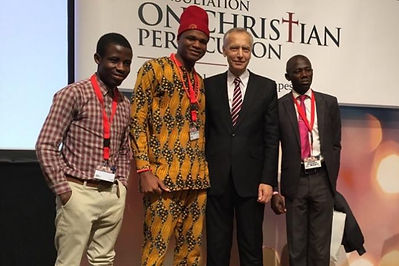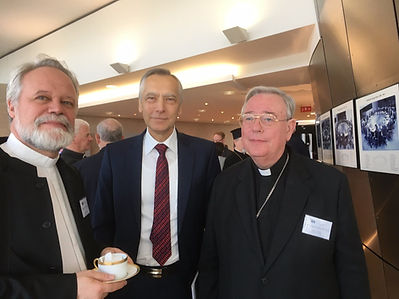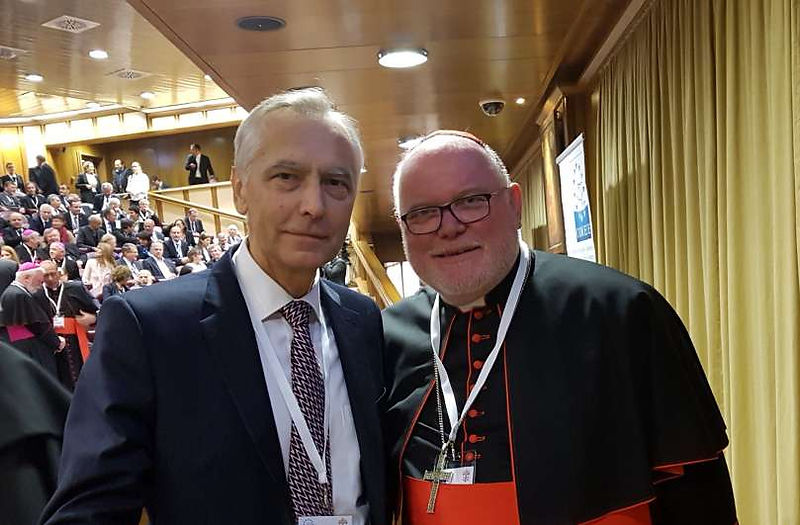
Credit: European People’s Party via Flickr CC BY 2.0
Vatican City, Nov 16, 2017 / 09:00 pm (CNA/EWTN News).- The European Union’s special envoy for religious freedom has called for “responsible freedom,” in the wake of the Vatican-based (Re)Thinking Europe conference, held Oct. 27 – 29 in the Vatican. In an interview with CNA, EU Special Envoy Jan Figel stressed that “Christians should contribute to a free and one, reconciled and united Europe, by their active responsibility on all levels of public life.” He underscored that “responsible freedom is what we all need. Without responsibility, freedom remains immature, or even ceases to exist, becoming an easy victim of populism extremism or even suffer for various ideology.” A former EU Commissioner for School and Education, Jan Figel was appointed in May 2016 as the Special Envoy for Freedom of Religion and Belief outside the European Union. Figel is a native of Slovakia, and a well-known figure in Slovakian and European politics.
The appointment of an EU Special Envoy for Religious Freedom was announced in 2016, after Pope Francis was awarded the Charlemagne Prize by EU Commission President Jean Claude Juncker. The Pope stressed the importance of protecting religious freedom when he received the prize.
As special envoy, Figel took part in last month’s (Re)Thinking Europe gathering, which brought European leaders together to reflect on the culture, heritage, and future of the continent. Figel said the conference was an occasion to discuss religious freedom in Europe, and around the globe. “Freedom is a great human gift and phenomenon, but without responsibility it is not sustainable,” Figel told CNA. “Freedom needs maturity via active citizenship. We are free to choose, to decide, but only by seeking the common good will we strengthen our freedom. Decisions opposed to the freedoms and fundamental rights of others weaken or even eliminate overall freedom in society,” he added. On the other hand, Figel said, “responsible freedom recognizes and respects duties and obligations together with rights. Our modern sense of unilateral, rights-only ‘freedom’ undermines and erodes the freedom of a whole society. My rights are possible and achievable only by respecting my obligations towards the others and towards the community I live in. This balanced attitude represents mature acting, and builds up responsible freedom”. Figel emphasized that “Christians have been very active in the process of European integration. Their political contribution was unquestionable, even decisive through leaders like Schuman, Adenauer, De Gasperi, Monet and others.” “Today Christians should not stay aside or lament over the situation, but the opposite, they should bring again what is missing and needed for European renewal: fundamental values, personal commitment and spirit of unity. These contributions cannot be generated by the market, by the euro or by geography. They are fruits of responsible freedom, sense of solidarity and goodwill, and of reasonable, true solutions of problems,” he said. “Europe knows very well two distinct lines of social evolution through the lessons of the twentieth century. And therefore Europe should embrace and promote the essential value of freedom of religion or belief much more actively.” Figel explained that “freedom of religion is a litmus test of all human rights, because if this is disregarded, other political and civil rights are restricted as well. I can speak a lot about this lesson from experiences in communist Czechoslovakia and in the Soviet bloc countries.” While Figel’s mandate concerns promoting religious liberty outside of Europe, he spoke with CNA about Europe’s own struggles to secure freedom of religion. According to the 2016 Aid to the Church in Need Report for Religious Freedom in the World, religious liberty continues to be threatened in several European nations.
Jan Figel noted that “internal and external EU policies are two parts of the same community agenda. Therefore more attention, fair engagement in favor of freedom of religion internationally can help to renew European commitment at home. This is one of the reasons why my mandate as special envoy is oriented outside the EU, but at the same time connected with the Lisbon Treaty.” The Lisbon Treaty is an international agreement that is the legal basis for the European Union. The treaty calls for dialogue and respect between EU nations and churches, religious associations and philosophical and non-confessional organizations. Figel told CNA that Pope Francis is an important figure for the protection of religious liberty in Europe. He said that the Pope “clearly understands the importance of freedom of religion for Europe, but for global development as well.” Figel praised the Pope’s recognition of “dignity, justice, solidarity and dialogue” as pillars of European identity.
“I see how important these principles and pillars are becoming for Europe and for the world as well,” he said. Figel said that “human dignity is the first and foundational value for people everywhere, especially after a century of genocides, starting in Armenia one hundred years ago, up to mass atrocities recently committed by ISIS. Peace is the fruit of justice. To work for justice, especially at the UN institutions, is the best war-preventive measure.” He added that the Pope’s principles “are needed if contemporary Europe is to become true the holder of its destiny, leader of humanity, protector of democracy, and example of universal solidarity. And such a Europe will serve as a source of hope and integral humanism for both its people and for the world. This is message of Robert Schuman and of EU’s founding fathers to our generation. I share this dream and vision”. As Europe begins to understand its identity, Figel said, “then reasonable reforms and policies must follow, responding to for today´s wave of frustration, populism and extremism.”
Figel said that now is the time for Europe to “shift from politics of identities to the ethics of responsibilities, without abandoning the importance of any identity, without questioning the diversity of our cultures, nations and religions. Unity, but not uniformity, based on equal dignity of all people is both a noble vision and a practical need. Christians and the Church historically offered a tremendous spiritual inspiration, a treasury of experience, and good tools to build and promote such a reconciled human community.”
Article available here: https://www.catholicnewsagency.com/news/europe-must-be-built-on-responsible-freedom-eu-religious-freedom-envoy-says-32918







